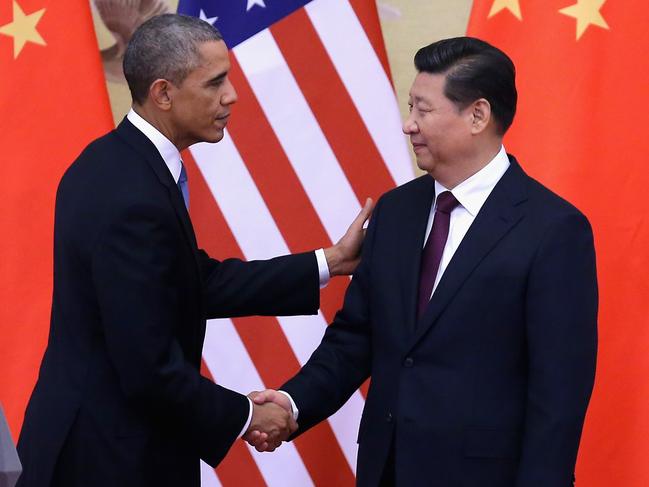What Joe Biden administration means for Australia
Australia is set to lose the privileged position of influence it sometimes enjoyed under Donald Trump, US political experts say.
Economy
Don't miss out on the headlines from Economy. Followed categories will be added to My News.
Australia will lose the privileged position of influence it sometimes enjoyed under Donald Trump during the Biden administration, but the loss will be offset by a more orderly and predictable White House, US political experts believe.
Trump rocked convention, and his rise prompted Canberra to try some pretty unorthodox diplomacy of its own. Ambassador Joe Hockey once posed as a journalist to get into a Republican presidential debate, while Malcolm Turnbull became the second leader to congratulate Donald Trump on his victory, leapfrogging the pecking order as it were, by getting Trump’s private phone number from golfer Greg Norman.
The diplomatic efforts paid off when Australia won exemptions from Trump administration tariffs on steel and aluminium – but Dr John Lee, Senior Fellow with the US Studies Centre, said the relationship would now “revert to what it generally has been before Trump, which is still a pretty good position”.


“Australia, along with Japan, really had better access and influence over American policies during the Trump administration than other countries, though when Biden comes in, it’s going to be a much more orderly process. Australia will still have very good access but we won’t have under Biden what we had under Trump,” Dr Lee said.
The dynamics will shift, and tariffs on steel and aluminium could once again loom as an issue, this time because of the Biden administration’s climate change policies, Dr David Uren, also from the US Studies Centre, told News Corp.
PARIS CLIMATE ACCORD
Joe Biden is expected to commence the process for the USA to re-join the Paris Climate Accord on his first day in office, and experts believe Washington may increasingly pressure Canberra into setting a goal of net zero emissions by 2050, as well as stronger interim targets.
Prime Minister Scott Morrison has stressed Australian policy is set by the Australian government, but his December decision to dump a controversial plan to use Kyoto carry-over credits to meet Paris 2030 emissions targets was interpreted by some observers as a sign that the Biden election victory had already caused a shift in position.

Dr Uren said it was possible the Biden administration would look at slapping a “carbon tariff” on goods with high emissions, such as Australian steel and aluminium, although it could be 2022 before any such move took effect.
“But another thing the Biden administration has spoken extensively about is working with allies, not against allies, as the Trump administration did,” Dr Uren said. “So even if the Biden administration pursues some form of carbon taxation aimed at imports, as I expect they will, they will be reluctant to take severe action against Australia just because they place a high priority on working with allies. But it is a risk that is out there.”
While there will be an element of catch-up for the Biden administration on climate matters, UK Prime Minister Boris Johnston has forged ahead with a number of quite dramatic environmental policies, including banning the sale of petrol cars by 2030. Dr Uren doubted Biden would follow suit.

“They’d be most unlikely to do anything in the environmental area where they’d be vulnerable to the criticism that it’s coming at the cost of American jobs,” he said. “And America is a very large country and to get things through you really need coalitions of support, and that tends to moderate what gets done.”
CORPORATE TAX
Biden’s plans to reverse some of the Trump era corporate tax cuts may also be stymied, with repercussions for Australia, Dr Uren said.
“If they make it a high priority they could get it through in 12 months, but I think it’s most unlikely that they will. Raising the company tax rate would bring strong hostility from the Republicans and I just doubt that with a pretty spare majority in the Senate, there’s not much chance at all that [the tax rate] will go from its current 21 per cent to 28 per cent,” he said. “Maybe they will be able to bag a minor increase, but I don’t think we’re going to see a return to high company taxation in the US, and that will leave Australia increasingly exposed. To the extent that people were hoping that the Biden administration would relieve the pressure on Australia to do something about its company tax rate, with the numbers in the Senate, I doubt that will come to fruition.”
TRANS PACIFIC PARTNERSHIP
Dr Uren is also sceptical America will be rejoining the Trans Pacific Partnership any time soon, despite Biden’s general support for trade deals.
But a Biden administration is expected to bolster the World Trade Organisation, which could be of benefit to Australia in its mushrooming trade disputes with China.

Dr Lee said Biden will retain the Trump administration’s tariffs on Chinese goods, at least at first, and America and Australia will both seek to minimise their reliance on Chinese manufacturers for certain products – an issue that rose in priority after the emergence of COVID-19.
“The conversation really has changed from ‘let’s source the cheapest product from anywhere just in time’ to ‘let’s source from reliable and friendly economies,’” Dr Lee said. “I don’t think it’s about self sufficiency, it’s not about producing everything in Australia, it’s more about ensuring we source from trusted supply chains and markets. One of the key terms you may see coming from both the Americans and the Australians is the notion of trusted secure economic ecosystems, which really means supply chains within trusted friendly economies.”
CHINA
The Biden administration may champion the idea of a G10 – the G7 countries plus Australia, India and South Korea – Dr Lee suggested, while Washington could also seek to use the “Quad” (the US, Australia, Japan and India) for trade purposes as well as security purposes, as a hedge against China.

Many of Biden’s senior foreign affairs and defence advisers also played roles within the Obama administration, and there had been some acknowledgment among some key figures that “during the Obama years they were too passive in responding to a lot of Chinese acts, and rather than lowering tensions it actually emboldened China,” Dr Lee said.
Beijing might soften its approach to Washington, at least at first, Dr Lee suggested, but it remained to be seen how Biden would tackle China.
“I think the question is still does President Biden have the temperament to confront Beijing, which is often needed or required to cause China to recalculate. If the Commander in Chief isn’t prepared to actually push China on issues that matter, then the policies are not as effective as they appear to be on paper.
“That is the question about president Biden, and I wouldn’t prejudge it.”
Originally published as What Joe Biden administration means for Australia





